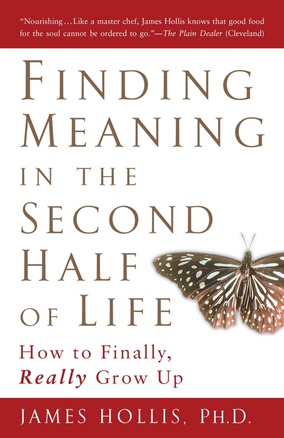Description
What does it really mean to be a grown up in today’s world?
We assume that once we “get it together” with the right job, marry the right person, have children, and buy a home, all is settled and well. But adulthood presents varying levels of growth, and is rarely the respite of stability we expected. Turbulent emotional shifts can take place anywhere between the age of thirty-five and seventy when we question the choices we’ve made, realize our limitations, and feel stuck—commonly known as the “midlife crisis.” Jungian psycho-analyst James Hollis believes it is only in the second half of life that we can truly come to know who we are and thus create a life that has meaning.
In Finding Meaning in the Second Half of Life, Hollis explores the ways we can grow and evolve to fully become ourselves when the traditional roles of adulthood aren’t quite working for us, revealing a new way of uncovering and embracing our authentic selves. Offering wisdom to anyone facing a career that no longer seems fulfilling, a long-term relationship that has shifted, or family transitions that raise issues of aging and mortality, Finding Meaning in the Second Half of Life provides a reassuring message and a crucial bridge across this critical passage of adult development.
About the Author
James Hollis, Ph. D., was born in Springfield, Illinois, and graduated from Manchester University in 1962 and Drew University in 1967. He taught Humanities 26 years in various colleges and universities before retraining as a Jungian analyst at the Jung Institute of Zurich, Switzerland (1977-82). He is presently a licensed Jungian analyst in private practice in Washington, D.C. He served as Executive Director of the Jung Educational Center in Houston, Texas for many years and now was Executive Director of the Jung Society of Washington until 2019, and now serves on the JSW Board of Directors. He is a retired Senior Training Analyst for the Inter-Regional Society of Jungian Analysts, was first Director of Training of the Philadelphia Jung Institute, and is Vice-President Emeritus of the Philemon Foundation. Additionally he is a Professor of Jungian Studies for Saybrook University of San Francisco/Houston.He lives with his wife Jill, an artist and retired therapist, in Washington, DC. Together they have three living children and eight grand-children.He has written a total of seventeen books, which have been translated into Swedish, Russian, German, Spanish, French, Hungarian, Portuguese, Turkish, Italian, Korean, Finnish, Romanian, Bulgarian, Farsi, Japanese, Greek, Chinese, Serbian, Latvian, Ukranian and Czech.
